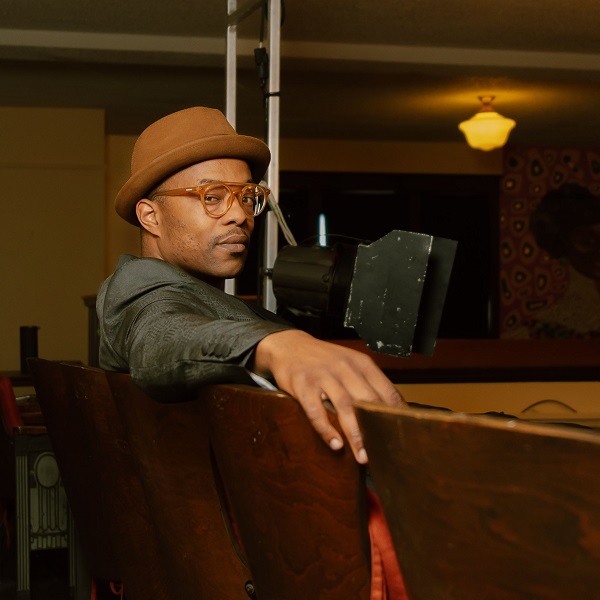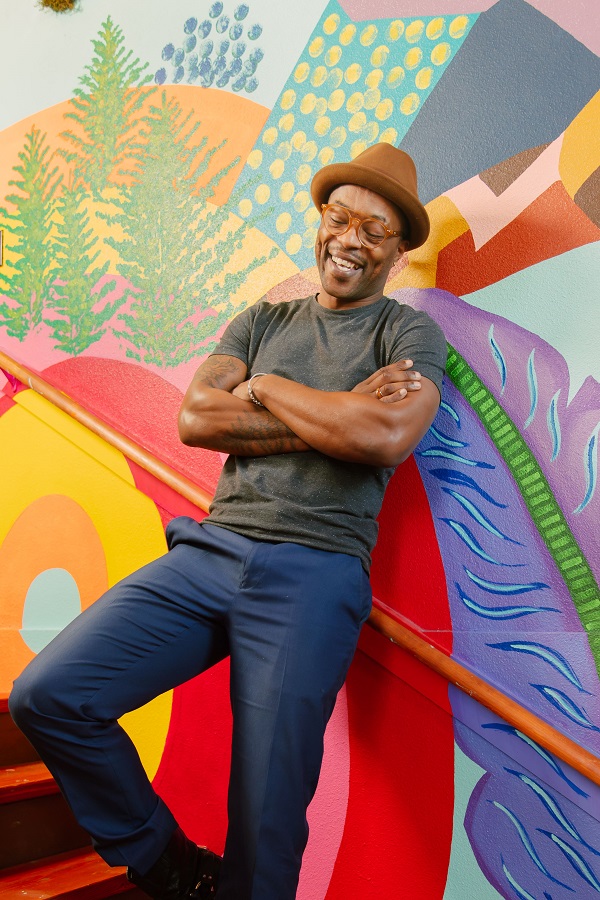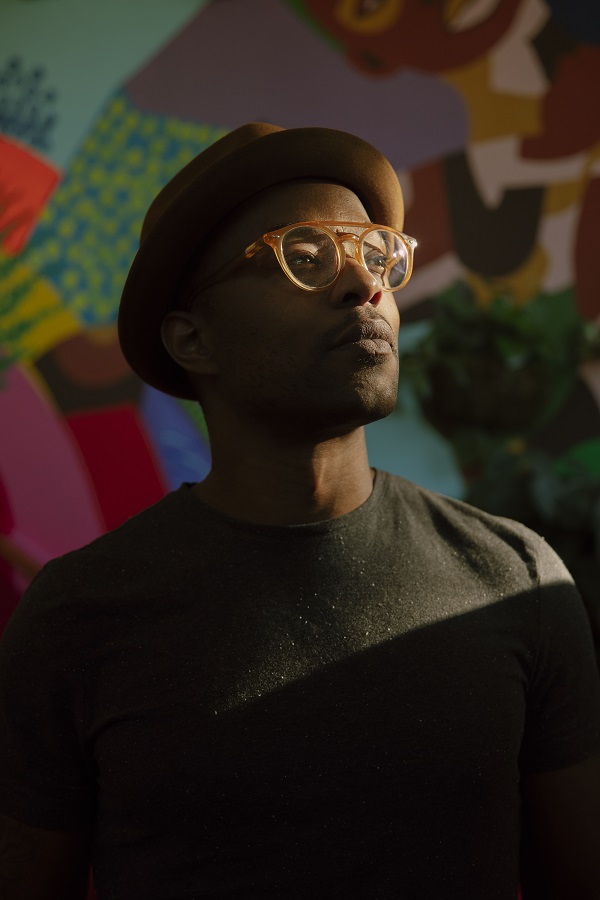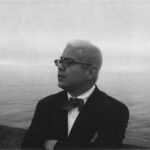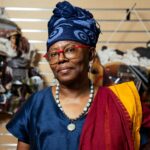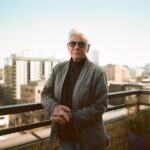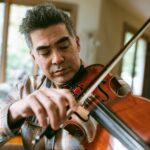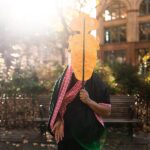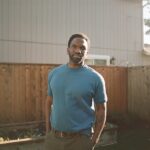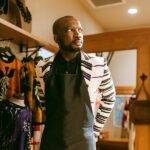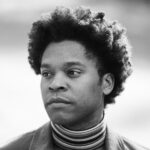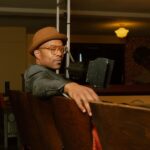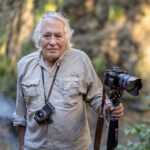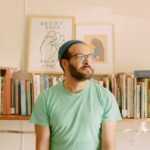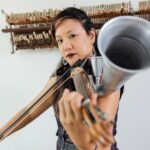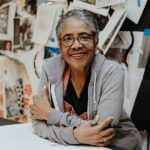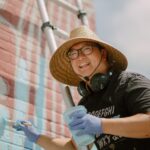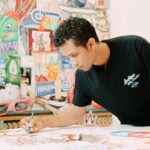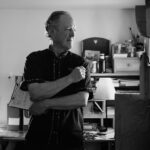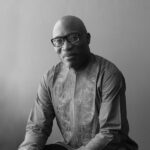Making a Home in the Arts
Written by Brett Campbell; Photographed by Frankie Tresser
Before he was an actor, Vin Shambry was acting. During the school day, he worked hard to blend in with the other sixth graders, pretending that he was coming to school from his house in the morning, and returning in the afternoon, eating dinner at the kitchen table with his parents and sister Maya, sleeping in his own bed.
It was all an act.
I was the boy following my mom with a shopping cart of our belongings, collecting cans in St. Johns…waiting all morning for the free lunch at Irving Park…. — From “Flower Joy,” by Vin Shambry.
After his father punched his mom during an argument, she escaped with twelve-year-old Vin and Maya. They wound up unhoused for months in 1994. Sleeping under a fifty-foot-tall fir tree in Northeast Portland’s Irving Park. Learning the park patrol schedule so they could scatter when cops walked by. At school, Vin went to classes like nothing was amiss, savoring the free breakfast, brushing his teeth in the restroom while the other kids recited the Pledge of Allegiance.
“As a kid growing up in poverty, I thought almost everything was an improv,” Shambry explains. “I had to figure out what was next, how I could navigate through.”
Two decades later, after gaining fame as an actor on Broadway, touring the world, then returning to Portland, Shambry recalled his experience in a poignant monologue on the public radio show The Moth. “Outdoor School” went viral, was incorporated into a best-selling anthology, and ultimately spawned an original theater project, a book in progress, and a made-in-Portland feature film.
New Roles
Acting wasn’t the only art form Shambry, the son and grandson of gospel singers, absorbed while growing up in Portland. “Singing was always inside me,” he remembers.
It took his high school choir teacher to bring the music out. When Grant High School’s music teacher greeted the freshman one day, Shambry replied, “How you doing?”—in a resonant bass voice. She enlisted him into Grant’s accomplished Royal Blues choir. Another teacher nabbed him for musical theater, encouraging him to “always say yes to everything.” He studied performers from Paul Robeson to the King’s Singers to contemporary Broadway star Brian Stokes Mitchell.
Shambry immediately felt at home on stage. “Internally, something switched on in my body,” he says. “This moment of awareness that I was in a space, an environment, where I could be myself. I could be silent and calm there, and not have to deal with my other life.”
Still, Shambry grappled with feelings of shame—at having to hustle for money to provide for his family, at deceiving everyone around him about his precarious circumstances, at living in poverty.
“I felt like a fraud,” he recalls, “living these two lives…knowing that by night, I’d have to go home and live my real reality.”
Learning the Hustle
The arts lifted Shambry out of Portland and poverty. After a year of college, he auditioned for a two-year program in New York’s famed American Musical and Dramatic Academy—and won a scholarship. Soon, he was taking classes from Broadway actors, rubbing shoulders with famous and soon-to-be famous performers.
But the skinny, dreadlocked kid from the streets of Portland wasn’t overwhelmed by Gotham’s storied performing arts mystique. “With my lived experience of Portland, going into New York, I understood the musicality of the hustle,” he says. “I loved it.”
He took advantage of the students’ unlimited access to practice studios to work on dance moves, piano technique, recordings. He put himself out there for roles, never getting discouraged when he didn’t land one, and tended bar to pay the bills.
Continue Reading
When the lead actor in a show he was understudying broke his ankle, Shambry stepped into the role—and stayed for three years, including an international tour. His most famous role was Tom Collins in Rent, but he played major roles in Honk, Miss Saigon, Big River, and more. Life was playing out like a classic Broadway story.
But after nearly a decade, he wanted to explore aspects of art and life that New York’s incessant hustle denied him. “I was walking in Bryant Park one day, by Times Square,” he remembers. “And I realized: I was done. Just done with the city.”
He’d learned everything he could, built up enormous credibility and wisdom. “I’m thankful to New York,” Shambry says. “I learned who I am as an actor, writer, producer, poet. I learned my whole identity.”
Passing on the Lessons
For months, back in Portland, Shambry didn’t tell anyone he was an actor. It was a time for reinvention.
When he finally did, he found Portland theater eager to embrace his extraordinary ability to project both strength and vulnerability, and his magnificent mahogany voice. Shambry won accolades, including a best lead actor Drammy award, for a slew of Portland roles. He performed in two US State Department-sponsored trips to Egypt, and on a TV series..
Even then, Shambry resisted being pigeonholed. “Everybody knew me as ‘the Black actor’ here in Portland, but I’m an artist.” He took up painting, worked at it for seven years without telling anyone until, 150 paintings later, he mounted an exhibition. He began writing a book of autobiographical short stories called, tellingly, Shame; performed live storytelling; directed a hip-hop version of Shakespeare’s Othello for Portland Actors Conservatory; and co-created Poorlandia, “an opera, a conversation, a painting,” about his experiences with homelessness, whiteness, and “the real Portlandia.” He cut an album, became a resident artist with Resonance Ensemble, performing with Portland Opera, and Portland Columbia Symphony.
But Shambry wanted more. Not for himself, but for the next generation of kids like he’d been—young, artistically inclined, held back by racism and poverty. Remembering those teachers who once saw in him what he couldn’t yet see in himself, Shambry began working with young people as acting coach, choreographer, and director. In 2022, he became artistic director at Alberta House in Portland’s historically Black Northeast neighborhood, creating space to nurture young Black Portlanders’ nascent artistic passions.
Volunteering with the Grant High choir, Shambry met his wife, Sarah. He’s determined to stay fully present in his two daughters’ lives, inculcating in them the joy in nature he found in his own childhood, unhoused, under the sheltering bower of towering firs.
In 2022, filming wrapped in Oregon City on the movie version of Outdoor School, with Shambry as executive producer and author. It recounts the story of twelve-year-old Vin (played by a young Portland schoolkid) and his family’s experiences with homelessness.
His three-man producer team—all African American graduates of Portland public schools — turned the project into a training program for BIPOC and women artists, drawing most of its crew from under-represented groups, and equipping them with skills to work in Portland’s film industry. They founded the nonprofit Lion Speaks to help make Portland’s overwhelmingly white film ecosystem more diverse and inclusive of the city’s entire population.
“I’ve always been the tree,” Shambry says, “the person rooted in the trauma that has happened in my life. Every year the leaves die and branches fall, but the root stays. The residual trauma flows through me as a creative adult. I can harness it now.”

